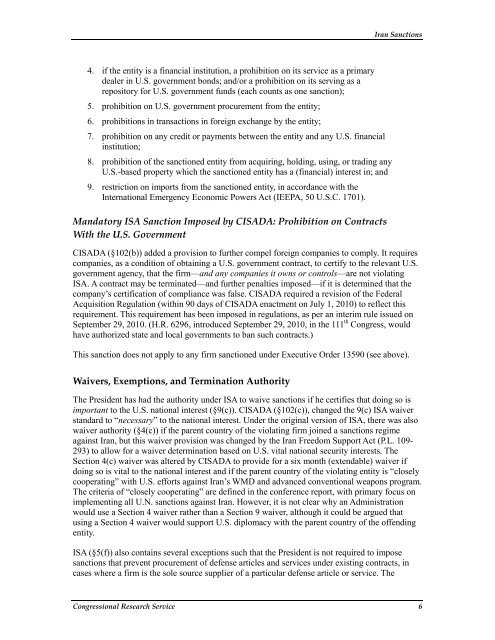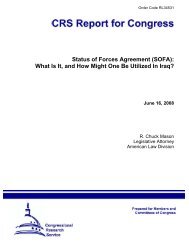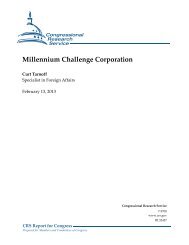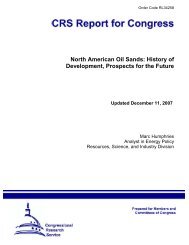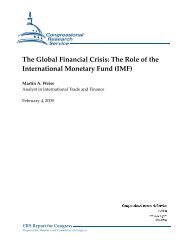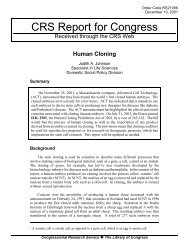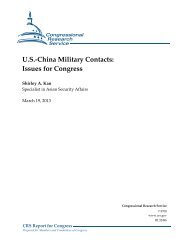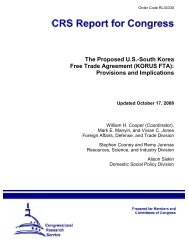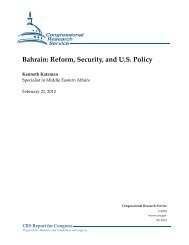Iran Sanctions - Foreign Press Centers
Iran Sanctions - Foreign Press Centers
Iran Sanctions - Foreign Press Centers
Create successful ePaper yourself
Turn your PDF publications into a flip-book with our unique Google optimized e-Paper software.
4. if the entity is a financial institution, a prohibition on its service as a primary<br />
dealer in U.S. government bonds; and/or a prohibition on its serving as a<br />
repository for U.S. government funds (each counts as one sanction);<br />
5. prohibition on U.S. government procurement from the entity;<br />
6. prohibitions in transactions in foreign exchange by the entity;<br />
7. prohibition on any credit or payments between the entity and any U.S. financial<br />
institution;<br />
8. prohibition of the sanctioned entity from acquiring, holding, using, or trading any<br />
U.S.-based property which the sanctioned entity has a (financial) interest in; and<br />
9. restriction on imports from the sanctioned entity, in accordance with the<br />
International Emergency Economic Powers Act (IEEPA, 50 U.S.C. 1701).<br />
Mandatory ISA Sanction Imposed by CISADA: Prohibition on Contracts<br />
With the U.S. Government<br />
<strong>Iran</strong> <strong>Sanctions</strong><br />
CISADA (§102(b)) added a provision to further compel foreign companies to comply. It requires<br />
companies, as a condition of obtaining a U.S. government contract, to certify to the relevant U.S.<br />
government agency, that the firm—and any companies it owns or controls—are not violating<br />
ISA. A contract may be terminated—and further penalties imposed—if it is determined that the<br />
company’s certification of compliance was false. CISADA required a revision of the Federal<br />
Acquisition Regulation (within 90 days of CISADA enactment on July 1, 2010) to reflect this<br />
requirement. This requirement has been imposed in regulations, as per an interim rule issued on<br />
September 29, 2010. (H.R. 6296, introduced September 29, 2010, in the 111 th Congress, would<br />
have authorized state and local governments to ban such contracts.)<br />
This sanction does not apply to any firm sanctioned under Executive Order 13590 (see above).<br />
Waivers, Exemptions, and Termination Authority<br />
The President has had the authority under ISA to waive sanctions if he certifies that doing so is<br />
important to the U.S. national interest (§9(c)). CISADA (§102(c)), changed the 9(c) ISA waiver<br />
standard to “necessary” to the national interest. Under the original version of ISA, there was also<br />
waiver authority (§4(c)) if the parent country of the violating firm joined a sanctions regime<br />
against <strong>Iran</strong>, but this waiver provision was changed by the <strong>Iran</strong> Freedom Support Act (P.L. 109-<br />
293) to allow for a waiver determination based on U.S. vital national security interests. The<br />
Section 4(c) waiver was altered by CISADA to provide for a six month (extendable) waiver if<br />
doing so is vital to the national interest and if the parent country of the violating entity is “closely<br />
cooperating” with U.S. efforts against <strong>Iran</strong>’s WMD and advanced conventional weapons program.<br />
The criteria of “closely cooperating” are defined in the conference report, with primary focus on<br />
implementing all U.N. sanctions against <strong>Iran</strong>. However, it is not clear why an Administration<br />
would use a Section 4 waiver rather than a Section 9 waiver, although it could be argued that<br />
using a Section 4 waiver would support U.S. diplomacy with the parent country of the offending<br />
entity.<br />
ISA (§5(f)) also contains several exceptions such that the President is not required to impose<br />
sanctions that prevent procurement of defense articles and services under existing contracts, in<br />
cases where a firm is the sole source supplier of a particular defense article or service. The<br />
Congressional Research Service 6


